八年级上册英语重点
- 格式:doc
- 大小:35.00 KB
- 文档页数:6
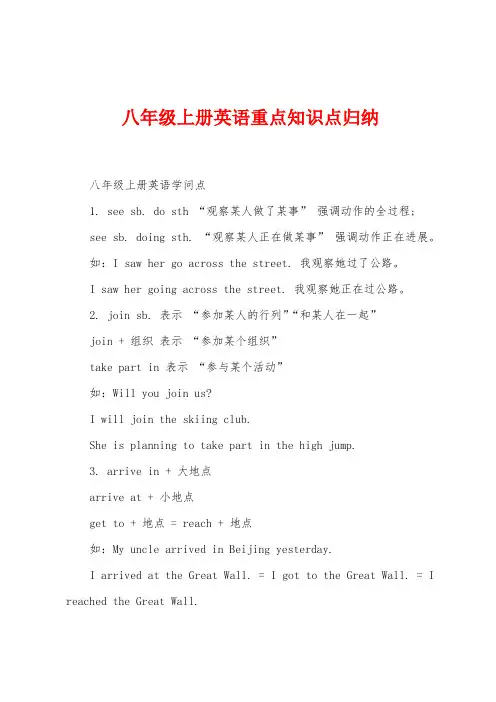
八年级上册英语重点知识点归纳八年级上册英语学问点1. see sb. do sth “观察某人做了某事”强调动作的全过程; see sb. doing sth. “观察某人正在做某事”强调动作正在进展。
如:I saw her go across the street. 我观察她过了公路。
I saw her going across the street. 我观察她正在过公路。
2. join sb. 表示“参加某人的行列”“和某人在一起”join + 组织表示“参加某个组织”take part in 表示“参与某个活动”如:Will you join us?I will join the skiing club.She is planning to take part in the high jump.3. arrive in + 大地点arrive at + 小地点get to + 地点 = reach + 地点如:My uncle arrived in Beijing yesterday.I arrived at the Great Wall. = I got to the Great Wall. = I reached the Great Wall.留意:reach here/there/home = get here/there/home = arrive here/there/home4. leave…离开……leave for…动身去…/离开到…如:They are leaving Beijing tomorrow. 明天他们要离开北京。
They are leaving for Japan the day after tomorrow. 后天他们要前往日本。
5. a few“几个,一些”修饰可数名词a little“一点点”修饰不数名词如:There are a few eggs in the basket.There is a little water in the bottle.6. how long 表示“多久(时间)”; 提问时间段.how often 表示“多常; 多久一次”; 提问时间的频率.如: They will stay in Beijing for a week. → How long will they stay in Beijing?He plays basketball twice a week. → How often does he play basketball?7. be good at (doing) sth. = do well in (doing) sth. 擅长于(做)某事如:She is good at (playing) baseball. = She does well in (playing) baseball.8. make sth/sb + adj. 使某物(某人)在某种状态keep …sth/sb + adj. 保持某物(某人)在某种状态如:Playing soccer can make your body strong.Swimming can help to keep your heart and lungs healthy.八年级英语语法学问一般将来时1. be going to 构造①表示主语规划、准备做某事。
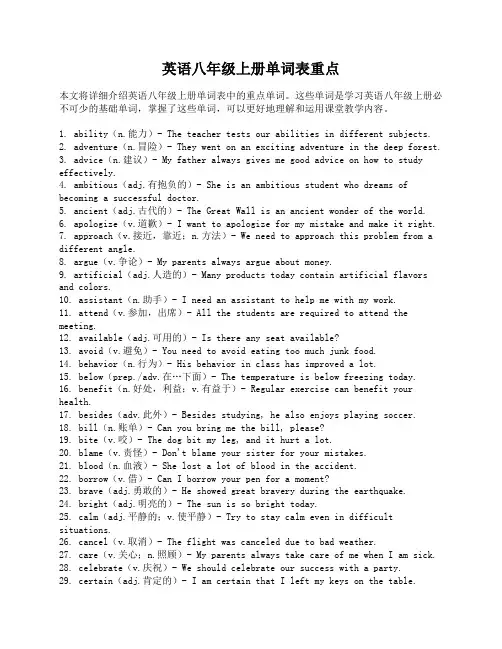
英语八年级上册单词表重点本文将详细介绍英语八年级上册单词表中的重点单词。
这些单词是学习英语八年级上册必不可少的基础单词,掌握了这些单词,可以更好地理解和运用课堂教学内容。
1. ability(n.能力)- The teacher tests our abilities in different subjects.2. adventure(n.冒险)- They went on an exciting adventure in the deep forest.3. advice(n.建议)- My father always gives me good advice on how to study effectively.4. ambitious(adj.有抱负的)- She is an ambitious student who dreams of becoming a successful doctor.5. ancient(adj.古代的)- The Great Wall is an ancient wonder of the world.6. apologize(v.道歉)- I want to apologize for my mistake and make it right.7. approach(v.接近,靠近;n.方法)- We need to approach this problem from a different angle.8. argue(v.争论)- My parents always argue about money.9. artificial(adj.人造的)- Many products today contain artificial flavors and colors.10. assistant(n.助手)- I need an assistant to help me with my work.11. attend(v.参加,出席)- All the students are required to attend the meeting.12. available(adj.可用的)- Is there any seat available?13. avoid(v.避免)- You need to avoid eating too much junk food.14. behavior(n.行为)- His behavior in class has improved a lot.15. below(prep./adv.在…下面)- The temperature is below freezing today.16. benefit(n.好处,利益;v.有益于)- Regular exercise can benefit your health.17. besides(adv.此外)- Besides studying, he also enjoys playing soccer.18. bill(n.账单)- Can you bring me the bill, please?19. bite(v.咬)- The dog bit my leg, and it hurt a lot.20. blame(v.责怪)- Don't blame your sister for your mistakes.21. blood(n.血液)- She lost a lot of blood in the accident.22. borrow(v.借)- Can I borrow your pen for a moment?23. brave(adj.勇敢的)- He showed great bravery during the earthquake.24. bright(adj.明亮的)- The sun is so bright today.25. calm(adj.平静的;v.使平静)- Try to stay calm even in difficult situations.26. cancel(v.取消)- The flight was canceled due to bad weather.27. care(v.关心;n.照顾)- My parents always take care of me when I am sick.28. celebrate(v.庆祝)- We should celebrate our success with a party.29. certain(adj.肯定的)- I am certain that I left my keys on the table.30. challenge(n.挑战;v.挑战)- Climbing Mount Everest is a great challenge for any mountaineer.31. champion(n.冠军)- He won the champion in the swimming competition.32. change(v.改变;n.变化)- I need to change my clothes before going out.33. charge(v.充电;n.费用)- You need to charge your phone before you go out.34. cheerful(adj.快乐的)- She always has a cheerful smile on her face.35. choice(n.选择)- The students have the freedom to make their own choices.36. comfortable(adj.舒适的)- This bed is very comfortable to sleep on.37. community(n.社区)- We should all contribute to our local community.38. compare(v.比较)- Let's compare the prices before making a decision.39. compete(v.竞争)- The athletes will compete in the city's marathon.40. complete(adj.完整的;v.完成)- Please complete your homework before tomorrow.41. complicated(adj.复杂的)- The math problem is too complicated for me to solve.42. confidence(n.信心)- She has confidence in her ability to succeed.43. connect(v.连接)- Can you help me connect the computer to the printer?44. consider(v.考虑)- We need to consider all the options before making a decision.45. convenient(adj.方便的)- Public transportation is very convenient in this city.46. convince(v.说服)- It's hard to convince him to change his mind.47. cook(v.烹饪)- My mother is cooking dinner for us.48. cool(adj.凉爽的)- The breeze feels cool on a hot summer day.49. courage(n.勇气)- It takes courage to stand up for what you believe in.50. create(v.创造)- Artists create beautiful paintings with their imagination.51. culture(n.文化)- Chinese culture is rich in history and tradition.52. cycle(v.骑自行车;n.循环)- I enjoy cycling in the park on weekends.53. damage(v.损害;n.损害)- The storm caused a lot of damage to the city.54. danger(n.危险)- There is a danger of falling rocks on this road.55. decision(n.决定)- Making decisions can be difficult sometimes.56. deliver(v.交付)- The postman delivers letters and packages to our house.57. deny(v.否认)- He denies being involved in the accident.58. depend(v.依赖)- We depend on each other for support and encouragement.59. depress(v.使沮丧)- The bad weather depresses me sometimes.60. describe(v.描述)- Can you describe the suspect to the police officer?61. design(v.设计;n.设计)- She is studying to become a fashion designer.62. determine(v.决定)- It's important to determine your goals and work towards them.63. develop(v.发展)- Children's brains develop quickly during their early years.64. digest(v.消化)- It's important to chew your food well to help digest it.65. disappoint(v.使失望)- I disappointed my parents with my poor grades.66. display(v.展示)- The museum displays ancient artifacts from around the world.67. disorder(n.混乱)- There was a disorder in the crowd as people tried to leave the stadium.68. distance(n.距离)- The distance from my house to school is about two miles.69. distribute(v.分发)- The teacher distributed the textbooks to the students.70. dominate(v.支配)- He dominates the team with his strong leadership skills.71. doubt(v.怀疑;n.怀疑)- I have no doubt that she will succeed in her career.72. draft(v.起草;n.草案)- He is currently drafting a contract for the new business deal.73. drama(n.戏剧)- She loves watching drama and going to the theater.74. drown(v.淹死)- It's important to know how to swim to prevent drowning.75. due(adj.到期的)- The rent is due at the beginning of every month.76. earn(v.赚得)- He earns a good salary as a software engineer.77. economic(adj.经济的)- The government is working on improving the economic situation.78. edit(v.编辑)- She is editing her novel to make it better.79. either(adj.任一的;pron.任一个)- You can choose either the red shirt or the blue shirt.80. elect(v.选举)- The students elected him as their class president.81. employ(v.雇佣)- The company employs over a hundred people.82. energy(n.能量)- Eating healthy foods can give you more energy.83. engine(n.发动机)- The engine of the car is making a strange noise.84. entire(adj.全部的)- We spent the entire day at the amusement park.85. environment(n.环境)- We should all do our part to protect the environment.86. equipment(n.设备)- The gym has a lot of exercise equipment.87. establish(v.建立)- They established a new company last year.88. evaluate(v.评估)- The teacher will evaluate our projects next week.89. evidence(n.证据)- There is no evidence to support his claim.90. evolve(v.进化)- Humans have evolved over millions of years.91. exchange(v.交换;n.交换)- We exchanged gifts with our friends during the holiday season.。
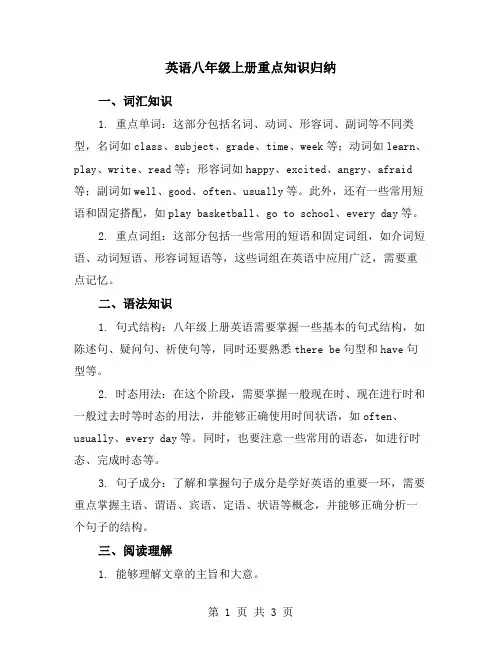
英语八年级上册重点知识归纳一、词汇知识1. 重点单词:这部分包括名词、动词、形容词、副词等不同类型,名词如class、subject、grade、time、week等;动词如learn、play、write、read等;形容词如happy、excited、angry、afraid 等;副词如well、good、often、usually等。
此外,还有一些常用短语和固定搭配,如play basketball、go to school、every day等。
2. 重点词组:这部分包括一些常用的短语和固定词组,如介词短语、动词短语、形容词短语等,这些词组在英语中应用广泛,需要重点记忆。
二、语法知识1. 句式结构:八年级上册英语需要掌握一些基本的句式结构,如陈述句、疑问句、祈使句等,同时还要熟悉there be句型和have句型等。
2. 时态用法:在这个阶段,需要掌握一般现在时、现在进行时和一般过去时等时态的用法,并能够正确使用时间状语,如often、usually、every day等。
同时,也要注意一些常用的语态,如进行时态、完成时态等。
3. 句子成分:了解和掌握句子成分是学好英语的重要一环,需要重点掌握主语、谓语、宾语、定语、状语等概念,并能够正确分析一个句子的结构。
三、阅读理解1. 能够理解文章的主旨和大意。
2. 能够理解文章的细节和事实。
3. 能够根据上下文猜测生词的意思。
4. 能够理解作者的观点和态度。
5. 不断提高阅读速度和理解能力。
四、写作知识1. 写作技巧:掌握一些基本的写作技巧,如正确的语法、拼写和标点符号,以及正确的文章结构等。
2. 写作实践:通过不断的写作练习,提高自己的写作能力。
除此之外,八年级上册英语还需要注意以下几个方面:1. 听力训练:每天坚持进行听力训练,提高听力理解能力。
2. 口语表达:鼓励学生多进行口语练习,提高口语表达能力。
在口语表达中要注意语音、语调和语速等方面的问题,同时也要注意表达的准确性和得体性。
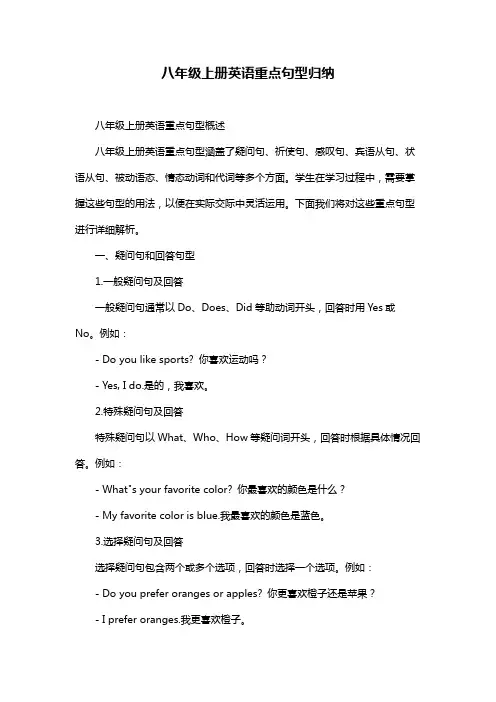
八年级上册英语重点句型归纳八年级上册英语重点句型概述八年级上册英语重点句型涵盖了疑问句、祈使句、感叹句、宾语从句、状语从句、被动语态、情态动词和代词等多个方面。
学生在学习过程中,需要掌握这些句型的用法,以便在实际交际中灵活运用。
下面我们将对这些重点句型进行详细解析。
一、疑问句和回答句型1.一般疑问句及回答一般疑问句通常以Do、Does、Did等助动词开头,回答时用Yes或No。
例如:- Do you like sports? 你喜欢运动吗?- Yes, I do.是的,我喜欢。
2.特殊疑问句及回答特殊疑问句以What、Who、How等疑问词开头,回答时根据具体情况回答。
例如:- What"s your favorite color? 你最喜欢的颜色是什么?- My favorite color is blue.我最喜欢的颜色是蓝色。
3.选择疑问句及回答选择疑问句包含两个或多个选项,回答时选择一个选项。
例如:- Do you prefer oranges or apples? 你更喜欢橙子还是苹果?- I prefer oranges.我更喜欢橙子。
4.反意疑问句及回答反意疑问句由一个陈述句和一个简短的疑问句组成,回答时用Yes或No。
例如:- You finished your homework, didn"t you? 你完成了你的作业,对吗?- Yes,I did.是的,我完成了。
二、祈使句和感叹句1.祈使句的结构及用法祈使句表示命令、请求、建议等,结构为动词原形+其他成分。
例如:- Don"t talk loudly.不要大声说话。
2.感叹句的结构及用法感叹句表示惊讶、喜悦、愤怒等情感,结构为形容词+名词+主语+谓语。
例如:- What a beautiful day it is! 今天真是个好天气!后续内容将陆续为大家解析其他重点句型,帮助大家更好地掌握八年级上册英语知识。
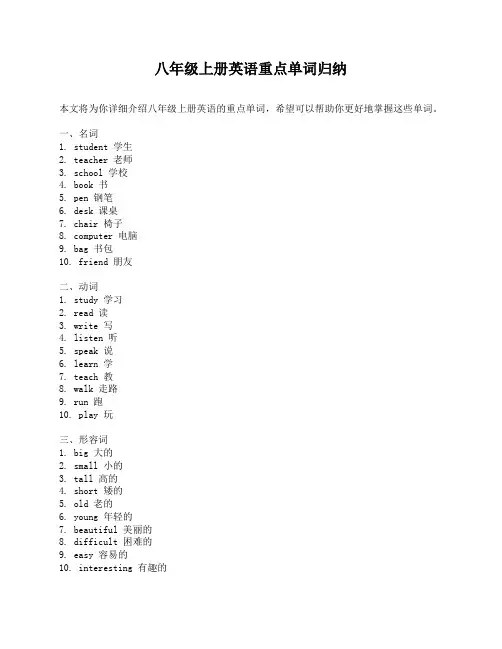
八年级上册英语重点单词归纳本文将为你详细介绍八年级上册英语的重点单词,希望可以帮助你更好地掌握这些单词。
一、名词1. student 学生2. teacher 老师3. school 学校4. book 书5. pen 钢笔6. desk 课桌7. chair 椅子8. computer 电脑9. bag 书包10. friend 朋友二、动词1. study 学习2. read 读3. write 写4. listen 听5. speak 说6. learn 学7. teach 教8. walk 走路9. run 跑10. play 玩三、形容词1. big 大的2. small 小的3. tall 高的4. short 矮的5. old 老的6. young 年轻的7. beautiful 美丽的8. difficult 困难的9. easy 容易的10. interesting 有趣的1. always 总是2. often 经常3. usually 通常4. sometimes 有时候5. never 从不6. well 好地7. quickly 快速地8. slowly 慢慢地9. carefully 小心地10. loudly 大声地五、介词1. in 在……里2. on 在……上3. under 在……下4. behind 在……后面5. in front of 在……前面6. between 在……之间7. beside 在……旁边8. near 在……附近9. at 在……处10. to 向六、连词1. and 和2. but 但是3. or 或者4. because 因为5. so 所以6. for 因为7. if 如果8. when 当……时候9. before 在……之前10. after 在……之后七、代词1. I 我2. you 你3. he 他4. she 她6. we 我们7. they 他们/她们/它们8. my 我的9. your 你的10. his 他的八、数字1. one 一2. two 二3. three 三4. four 四5. five 五6. six 六7. seven 七8. eight 八9. nine 九10. ten 十九、颜色1. red 红色2. blue 蓝色3. green 绿色4. yellow 黄色5. black 黑色6. white 白色7. purple 紫色8. orange 橙色9. pink 粉色10. brown 棕色十、家庭成员1. father 父亲2. mother 母亲3. brother 兄弟4. sister 姐妹5. son 儿子6. daughter 女儿7. husband 丈夫8. wife 妻子9. grandpa 爷爷10. grandma 奶奶1. cat 猫2. dog 狗3. fish 鱼4. bird 鸟5. elephant 象6. tiger 虎7. lion 狮子8. bear 熊9. panda 熊猫10. kangaroo 袋鼠十二、食物1. rice 米饭2. bread 面包3. cake 蛋糕4. egg 鸡蛋5. meat 肉6. fruit 水果7. milk 牛奶8. water 水9. coffee 咖啡10. tea 茶十三、交通工具1. car 汽车2. bus 公交车3. train 火车4. plane 飞机5. bicycle 自行车6. motorcycle 摩托车7. boat 船8. submarine 潜水艇9. helicopter 直升机10. spaceship 宇宙飞船十四、天气1. sun 太阳2. cloud 云3. rain 雨4. wind 风5. snow 雪6. hot 热7. cold 冷8. sunny 晴朗的9. cloudy 多云的10. windy 有风的十五、季节1. spring 春天2. summer 夏天3. autumn 秋天4. winter 冬天5. springtime 春季6. summertime 夏季7. autumntime 秋季8. wintertime 冬季9. season 季节10. holiday 假期以上是八年级上册英语的重点单词归纳,希望可以对你的学习有所帮助。
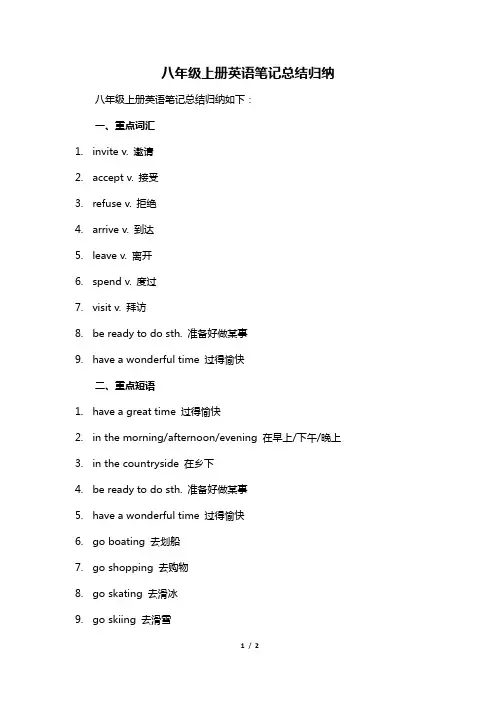
八年级上册英语笔记总结归纳八年级上册英语笔记总结归纳如下:一、重点词汇1.invite v. 邀请2.accept v. 接受3.refuse v. 拒绝4.arrive v. 到达5.leave v. 离开6.spend v. 度过7.visit v. 拜访8.be ready to do sth. 准备好做某事9.have a wonderful time 过得愉快二、重点短语1.have a great time 过得愉快2.in the morning/afternoon/evening 在早上/下午/晚上3.in the countryside 在乡下4.be ready to do sth. 准备好做某事5.have a wonderful time 过得愉快6.go boating 去划船7.go shopping 去购物8.go skating 去滑冰9.go skiing 去滑雪三、重点句型1.Would you like to do sth? 你想要做某事吗?2.What would you like to do? 你想要做什么?3.How about going boating? 去划船怎么样?4.Would you like to go skating? 你想要去滑冰吗?5.Shall we go skiing? 我们去滑雪好吗?6.Why not go boating? 为什么不去划船呢?7.What about going shopping? 去购物怎么样?8.How about going skating? 去滑冰怎么样?。
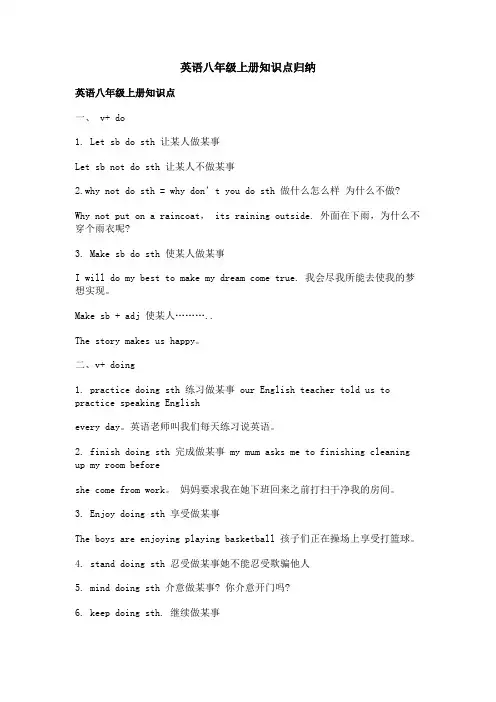
英语八年级上册知识点归纳英语八年级上册知识点一、 v+ do1. Let sb do sth 让某人做某事Let sb not do sth 让某人不做某事2.why not do sth = why don’t you do sth 做什么怎么样为什么不做?Why not put on a raincoat, its raining outside. 外面在下雨,为什么不穿个雨衣呢?3. Make sb do sth 使某人做某事I will do my best to make my dream come true. 我会尽我所能去使我的梦想实现。
Make sb + adj 使某人………..The story makes us happy。
二、v+ doing1. practice doing sth 练习做某事 our English teacher told us to practice speaking Englishevery day。
英语老师叫我们每天练习说英语。
2. finish doing sth 完成做某事 my mum asks me to finishing cleaning up my room beforeshe come from work。
妈妈要求我在她下班回来之前打扫干净我的房间。
3. Enjoy doing sth 享受做某事The boys are enjoying playing basketball 孩子们正在操场上享受打篮球。
4. stand doing sth 忍受做某事她不能忍受欺骗他人5. mind doing sth 介意做某事? 你介意开门吗?6. keep doing sth. 继续做某事She will keep fighting in this new semester. 在新学期,她将继续努力奋斗7. miss 想念 I miss you very muchMiss sth 错过………….he got up late this morning,so he missed the busMiss doing sth 错过做某事。

八年级上册英语重点知识点英语重点学问点一、重点短语1. on time2. best wishes3. give a talk4. for example5. short for6. a waste of time7. go on a field trip8. go fishing9. I agree10. next week11. the day after tomorrow12. have a picnic13. have some problems doing sth.14. go the wrong way15. hurry up16. get together17. in the open air18. on Mid-Autumn Day19. come over20. have to21. get home22. agree with23. in the country24. in town25. all the same26. in front of27. on the left/right side28. next to29. up and down30. keep healthy31. grow up32. at the same time33. the day before yesterday35. last Saturday36. half an hour ago37. a moment ago38. just now39. by the way40. all the time41. at first二. 重要句型1. have fun doing sth.2. Why dont you?3. Were going to do sth.4. start with sth.5. Why not?6. Are you going to?7. be friendly to sb.8. Youd better do sth.9. ask sb. for sth.10. say goodbye to sb.11. Good luck(with sb)!三. 交际用语1.Welcome backto school!2.Excuse me. Im sorry Im late, because the traffic is bad.3.It doesnt matter.4.Happy Teachers Day !5.Thats a good idea.6.What are you going to do?7.Where are we going ?8.What are we going to do ?9.Im good at10.Its not far from11. Are you free tomorrow evening?12.Would you and Lily like to come over to my home for Mid-Autumn Festival?13.Im glad you can come.14.Thanks for asking us.15.How about another one?16.May I have a taste?17.Let me walk with you.18.What do you have to do?19.Do you live on a farm?20.Which do you like better, the city or the country?21.Which do you like best, dogs, cats or chickens?22.Shall we go at ten? Good idea!23.---Lets make it half past one. ---OK.24.---Why not come a little earlier? ---All right.25.Excuse me. Wheres the nearest post office, please?26.Its over there on the right.27.Im sorry I dont know.28.Youd better29.Thank you all the same.30.Which bus do I take?31.Go along this road.32.What day was it yesterday?33.Im sorry to hear that.34.I hope youre better now.35.Why did you call me?36.I called to tell四. 重要语法1.be going to的用法;2.形容词的比拟级、最高级;3.形容词和副词的比拟4.一般过去时五.重要学问点讲解1. on the street / in the street表示在街上时,on the street 和in the street 都可以,在美国多用on the street, 在英国多用in the street. 例如:We have a house in the street. 我们在街上有座房子。
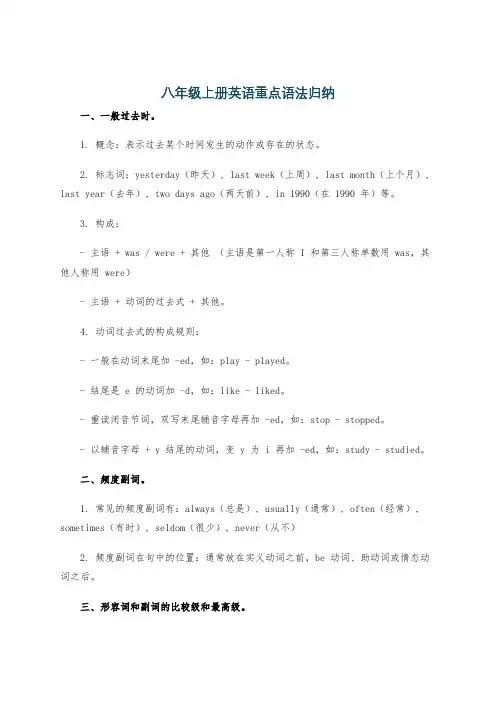
八年级上册英语重点语法归纳一、一般过去时。
1. 概念:表示过去某个时间发生的动作或存在的状态。
2. 标志词:yesterday(昨天), last week(上周), last month(上个月), last year(去年), two days ago(两天前), in 1990(在 1990 年)等。
3. 构成:- 主语 + was / were + 其他(主语是第一人称 I 和第三人称单数用 was,其他人称用 were)- 主语 + 动词的过去式 + 其他。
4. 动词过去式的构成规则:- 一般在动词末尾加 -ed,如:play - played。
- 结尾是 e 的动词加 -d,如:like - liked。
- 重读闭音节词,双写末尾辅音字母再加 -ed,如:stop - stopped。
- 以辅音字母 + y 结尾的动词,变 y 为 i 再加 -ed,如:study - studied。
二、频度副词。
1. 常见的频度副词有:always(总是), usually(通常), often(经常), sometimes(有时), seldom(很少), never(从不)2. 频度副词在句中的位置:通常放在实义动词之前,be 动词、助动词或情态动词之后。
三、形容词和副词的比较级和最高级。
1. 比较级的构成规则:- 一般在词尾加 -er。
- 以不发音的 e 结尾的词加 -r。
- 重读闭音节词,双写末尾辅音字母再加 -er。
- 以“辅音字母 + y”结尾的词,变 y 为 i 再加 -er。
- 多音节词和部分双音节词在前面加 more。
2. 最高级的构成规则:- 一般在词尾加 -est。
- 以不发音的 e 结尾的词加 -st。
- 重读闭音节词,双写末尾辅音字母再加 -est。
- 以“辅音字母 + y”结尾的词,变 y 为 i 再加 -est。
- 多音节词和部分双音节词在前面加 most。
3. 比较级和最高级的用法:- 比较级用于两者之间的比较,常用 than 连接。
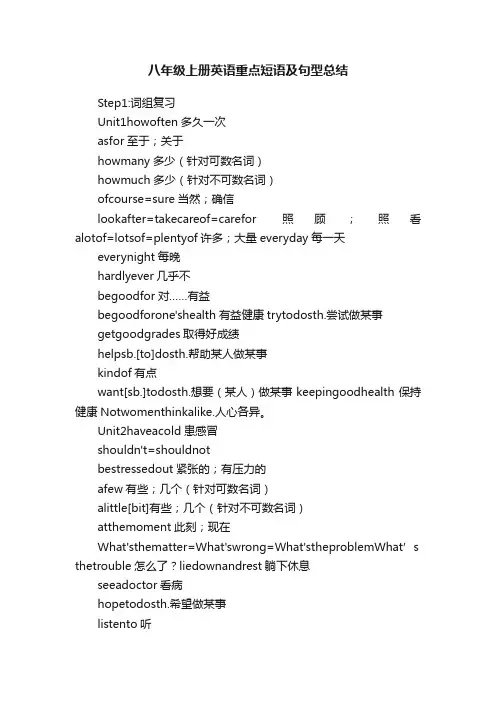
八年级上册英语重点短语及句型总结Step1:词组复习Unit1howoften多久一次asfor至于;关于howmany多少(针对可数名词)howmuch多少(针对不可数名词)ofcourse=sure当然;确信lookafter=takecareof=carefor照顾;照看alotof=lotsof=plentyof许多;大量everyday每一天everynight每晚hardlyever几乎不begoodfor对……有益begoodforone'shealth有益健康trytodosth.尝试做某事getgoodgrades取得好成绩helpsb.[to]dosth.帮助某人做某事kindof有点want[sb.]todosth.想要(某人)做某事keepingoodhealth保持健康Notwomenthinkalike.人心各异。
Unit2haveacold患感冒shouldn't=shouldnotbestressedout紧张的;有压力的afew有些;几个(针对可数名词)alittle[bit]有些;几个(针对不可数名词)atthemoment此刻;现在What'sthematter=What'swrong=What'stheproblemWhat’s thetrouble怎么了?liedownandrest躺下休息seeadoctor看病hopetodosth.希望做某事listento听forexample举个例子begoodfor对……有益it's+adj.+[forsb.]+todosth.做某事(对某人来说)……(加形容词)gettired感到疲倦stayhealthy保持健康givesb.sth.=givesth.tosb.把某物给某人needtodosth.需要做某事Unit3howlong多久getback=comeback回来takeavacation=haveavacation去度假alot=verymuch很;非常begoingtodosth.将要去做某事sound+adj.听起来……(加形容词)soundlike+n.听起来像……(加名词)haveagoodtime=havefun=enjoyoneself玩得愉快showsb.sth.=showsth.tosb.把某物给某人看wanttodosth.=wouldliketodosth.想要做某事plantodosth.计划做某事spendsometime[in]doingsth.花时间做某事needtodosth.需要做某事asksb.aboutsth.询问某人某方面的事情goshopping去购物leavefor离开去某地Unit4bybus=takethebus乘公共汽车howfar多远dependon依赖于byboat=taketheboat乘船lookat看bytrain=takethetrain乘火车bybike=rideone'sbike骑车bysubway=takethesubway乘地铁byplane=taketheplane乘飞机onfoot走路getup起床havebreakfast吃早饭leaveforsomewhere离开去某地takesb.tosomewhere带某人去某地halfanhour=thirtyminutes半小时(三十分钟)aroundtheworld=allovertheworld全世界gettoschool到学校thinkof认为onweekend在周末Unit5thedayaftertomorrow后天thedaybeforeyesterday前天comeover来访studyforatest复习迎考gotothedoctor=seethedoctor看病haveto不得不;必须(强调客观上)must不得不;必须(强调主观上)helpsb.withsth.=helpsb.[to]dosth.帮助某人做某事toomuch+n.太多(针对不可数名词)toomany+n.太多(针对可数名词)muchtoo+adj.太……(加形容词)gotothemovies看电影practicedoingsth.练习做某事thanksfor[doing]sth.为(做)某事而感谢gotothedentist看牙医begoingtodosth.将要做某事(该事已计划好)willdosth.将要做某事(该事尚未计划)keepquiet保持安静Unit6morethan超出……incommon共同的begoodat=dowellin在某方面做得好mostof大多数insomeways在某些方面thesameas与……一样makesb.+adj.让某人(感觉)……(加形容词)stopdoingsth.停止做某事stoptodosth.停止当前做的事去做另一件事beginwith以……开始eachother互相enjoyoneself=havefun=haveagoodtime玩得高兴spendsometime[in]doingsth.=spendsometimeonsth.花时间做某事plantodosth.计划做某事onafarm在农场Unit7turnon打开(电器)[闭合开关]turnoff关闭(电器)[断开开关]cutup切碎mixup混合add...to...把……加到……上pour...into...把……浇到……里面put...in...把……放到……里面put...on...把……放到……上面acupof一杯ateaspoonof一勺Unit8hangout闲逛sleeplate睡过头takephotos=takepictures照相haveagreattime=havefun=enjoyoneself玩得高兴attheendof 在……的尽头theclassmonitor班长adayoff一整天goforadrive开车兜风havefundoingsth.做某事很愉快abowlof一碗helpsb.[to]dosth.帮助某人做某事一些不规则动词的原形和过去式:hang→hung buy→boughtsleep→sleptread/ri:d/→read/red/Unit9too...to...太……以致不能……tak epartin=join参加becauseof因为……majorin主修;专研startdoingsth.开始做某事(该事已计划好)starttodosth.开始做某事(该事尚未计划)spendsometimewithsb.花时间和某人在一起spendsometime[in]doingsth.=spendsometimeonsth.花时间做某事seesb.dosth.看见某人做某事(强调全局)seesb.doingsth.看见某人做某事(强调偶然性)Unit10growup成长;长大atthesametime同时allover遍及allovertheworld=aroundtheworld全世界begoingtodosth.将要做某事practicedoingsth.练习做某事studyhard努力学习takelessons上课sound+adj.听起来……(加形容词)soundlike+n.听起来像……(加名词)savemoney存钱buysb.sth.=bysth.forsb.给某人买某物buysth.withthemoney用钱买某物writearticles写文章learntodosth.学习做某事getgoodgrades取得好成绩playsports运动keepfit保持健康writetosb.给某人写信enjoydoingsth.享受做某事ayearortwo一两年=oneortwoyears Unit11dothedishes=washthedishes洗碗takeout取出makeone'sbed整理床铺workon从事;忙于dochores=dohousework干家务dothelaundry=washtheclothes洗衣服takecareof=carefor=lookafter照看;照顾sweepthefloor扫地foldone'sclothes叠衣服gotothemovies看电影getaride骑车gotoameeting开会hate(todo/doing)sth.讨厌做某事like(todo/doing)sth.喜欢做某事invitesb.tosomewhere邀请某人去某地gotothestore=goshopping购物forgettodosth.忘记做某事(该事尚未做)forgetdoingsth.忘记做某事(该事已做过)givesb.sth.=givesth.tosb.把某物给某人buysb.sth.=buysth.forsb.买某物给某人onvacation度假Unit12closeto=near靠近;接近inexpensive=cheap便宜的clothingstore服装店radiostation广播站talentshow业余歌手演唱会itisadj.[forsb.]todosth.做某事(对某人来说)感觉……(加形容词)cuttheprice打折not...atall=not...intheslightest一点也不infact实际上payfor为……而付款sth.costsb.(money)某人花钱买了某物good/well→better→thebest形容词good/副词well的原级、比较级和最高级bad/badly→worse→theworst形容词bad/副词badly的原级、比较级和最高级Step2:重点句型及结构1.wanttodosthwantsbtodosth2.wouldliketodosthwouldlikesbtodosthwouldlovetodosth3.begoodforbegoodatbegoodtobegoodwith4.bebadfor5.beangrywithsb6.helpsbtodosthhelpsbwithsth7.bethesameasbedifferentfrom8.liketodolikedoing9.enjoydoingsth10.start/begantodosthstar/begandoingsthstar/beganwithsth11.hope/wishtodosthhope/wish+从句12.Itis+adj.+todosth13.bepopularwith14.needtodosth15.sendsthtosbsendsbsth16.showsbsthshowsthtosb17.rentsthfromsb rentsthtosb18.asksbtodosth19.plantodosth20.finishdoingsth21.decidetododecideonsth22.befamousforbefamousas23.forgettodo forgetdingsth24.remembertodo rememberdoingsth25.spend……onsth spend……(in)doingsth spend……with sbpay……forsth sthcostsb……Ittakesbsometimetodosth26.Thanksfordoingsth27.begoingtodosth28.How/Whataboutdoingsth29.thinkaboutdoingsth30.trytodosthtrydoingsthtryone’sbesttodosth31.anumberof thenumberof32.Whatdoyouthinkof……?33.Howdoyoulike……?34.needtodosth35.letsbdosthmakesbdosthhavesbdosth36.dowellingetonwellwith37.bepopularwithsb/doc/9f3736681.html,ughatsb 39.bebusywithsthbebusydoingsth40.感叹句:what+(a/an)+adj.+名词+主语+谓语!How+adj./adv+主语+谓语!41.…as+adj.+as…42.A+形容词或副词的比较级+than+B43.….the+形容词或副词的最高级+(of/in……)44.stoptodosthstopdoingsth45.too…to…so…that…not……enoughtodo46.learntodosth47.seesbdosthseesbdoingsth48.because+that从句becauseof+名词(短语)49.not……until……50.whynotdosthWhydon’tyoudosth51.begoingto=wanttodo52.practicedoingsth53.send……to……54.getaletterfromsbhearfromsb55.keep+sb/sth.+adj.keep(sb)doingsth.keep(on)doingsth.keepsb./sth.away(fromsb./sth.)keepupwithsb.=catchupwithsb./doc/9f3736681.html,municatewithsb.57.Couldyoupleasedosth. Wouldyouminddoingsth58.hatesth.hatetodosth.hatedoingsth.59.borrowsth.fromsb.lendsb.sth.=lendsth.tosb.60.invitesb.todosthinvitesbtosomeplace61.agreesb.todosth.agreewithsb.62.havetodosthneedtodosthstarttodosthbegintodosthasksbtodosth63.moveto/into64.thanksfor65.doasurveyof…makeasurveyof…66.bepopularwith…67.besuccessfulin(doing)sth succeedin(doing)sth68.wintheprizefor…69.sth+adj.(adv)+enough(forsb)todosth.70.becloseto……befarfrom…71.buysbsth=buysthforsb makesbsth=makesthforsbgivesbsth=givesthtosb72.notatall73.oneof+可数名词的复数形式74.anumberofthenumberof。
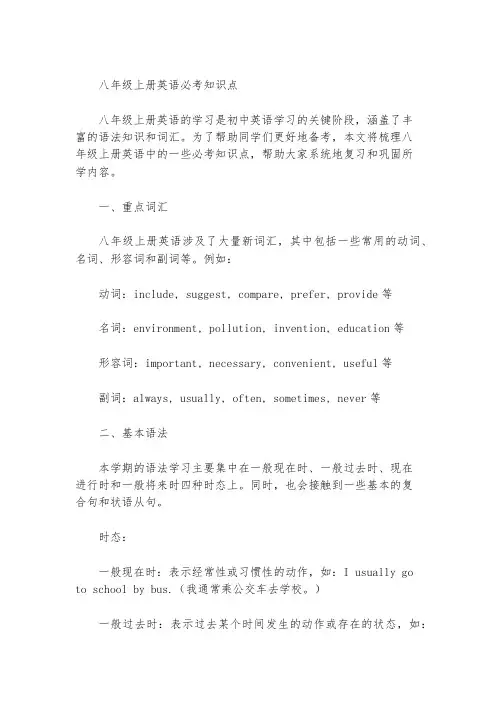
八年级上册英语必考知识点八年级上册英语的学习是初中英语学习的关键阶段,涵盖了丰富的语法知识和词汇。
为了帮助同学们更好地备考,本文将梳理八年级上册英语中的一些必考知识点,帮助大家系统地复习和巩固所学内容。
一、重点词汇八年级上册英语涉及了大量新词汇,其中包括一些常用的动词、名词、形容词和副词等。
例如:动词:include, suggest, compare, prefer, provide等名词:environment, pollution, invention, education等形容词:important, necessary, convenient, useful等副词:always, usually, often, sometimes, never等二、基本语法本学期的语法学习主要集中在一般现在时、一般过去时、现在进行时和一般将来时四种时态上。
同时,也会接触到一些基本的复合句和状语从句。
时态:一般现在时:表示经常性或习惯性的动作,如:I usually goto school by bus.(我通常乘公交车去学校。
)一般过去时:表示过去某个时间发生的动作或存在的状态,如:I went to the zoo last weekend.(我上周末去了动物园。
)现在进行时:表示正在进行的动作或发生的情况,如:She is studying for the exam.(她正在为考试而学习。
)一般将来时:表示将来某个时间将要发生的动作或存在的状态,如:I will meet my friend at the park tomorrow.(我明天会在公园和朋友见面。
)复合句:主句和从句构成的句子,如:I think(主句) that he will come(从句).(我认为他会来。
)状语从句:用来修饰主句中的动词、形容词或副词等的从句,如:If it rains(条件状语从句), we will stay at home.(如果下雨,我们就会待在家里。
人教版八年级上册英语知识点总结一、语法重点1. 时态- 一般现在时:表示经常发生的动作或状态,以及普遍真理。
- 一般过去时:描述过去发生的动作或状态。
- 现在进行时:表示正在进行的动作。
- 过去进行时:描述过去某一时刻正在进行的动作。
2. 代词- 人称代词主格:I, you, he, she, it, we, they。
- 物主代词:my, your, his, her, its, our, their。
- 反身代词:myself, yourself, himself, herself, itself, ourselves, yourselves, themselves。
3. 介词- 表示时间的介词:at, on, in。
- 表示地点的介词:at, on, in。
- 其他常用介词:with, by, for, from, to, of。
4. 句型结构- 一般疑问句:使用助动词do/does构成。
- 特殊疑问句:使用疑问词who, what, where, when, why, how 等。
- 否定句:使用助动词do/does后跟not。
5. 词汇- 动词短语:take off, turn on/off, get up, go to bed等。
- 形容词和副词:big/large, small, quick/fast, slowly, carefully等。
- 常用名词:student, teacher, school, family, friend等。
二、词汇与短语1. 学校相关词汇- classroom, teacher, student, library, gym, cafeteria。
- subject, lesson, homework, project, test, exam。
2. 家庭与朋友- family, parent, brother, sister, friend, neighbor。
一、重点单词(部分单词及词性、发音、释义)•anyone ['eniwʌn]:pron. 任何人•anywhere ['eniweə(r)]:adv. 任何地方;n. 任何(一个)地方•wonderful ['wʌndəfl]:adj. 精彩的;极好的•few[fjuː]:adj. 很少的;n. 少量•most [məʊst]:adj. 最多的;大多数的•something ['sʌmθɪŋ]:pron. 某事物•nothing ['nʌθɪŋ]:pron. 没有什么;n. 没有•myself [maɪ'self]:pron. 我自己•yourself [jɔː'self]:pron. 你自己;你亲自•bored [bɔːd]:adj. 无聊的;厌烦的;郁闷的•diary ['daɪəri]:n. 日记;日记簿(keep a diary)•activity [æk'tɪvəti]:n. 活动;活跃•try [traɪ]:v. 尝试;设法;努力(try to do sth. /try doing sth.)•bicycle ['baɪsɪkl]:n. 自行车•building ['bɪldɪŋ]:n. 建筑物•trader ['treɪdə(r)]:n. 商人;商船•wonder ['wʌndə(r)]:v. 惊奇;想知道;怀疑•enough [ɪ'nʌf]:adj. 足够的;adv. 足够地;充分地•dislike [dɪs'laɪk]:v. 不喜欢;厌恶;n. 不喜爱;厌恶;反感二、重点短语(部分短语及释义)1.go on vacation去度假2.stay at home呆在家3.go to the mountains上山/进山4.visit museums参观博物馆5.go shopping去购物6.help with housework帮助做家务活7.on weekends在周末8.how often多久一次9.hardly ever几乎不10.stay up late熬夜11.at least至少12.play sports锻炼身体13.go to the movies去看电影14.in one’s free time在某人的空闲时间15.not...at all根本不16.the most popular最流行的17.such as例如18.play tennis打网球19.swing dance摇摆舞20.have a good time玩得愉快三、重点句型(部分句型及示例)1.Where did you go on vacation?o I went to New York City.2.Did you go out with anyone?o No, No one was here. Everyone was on vacation.3.Did you buy anything special?o Yes, I bought something for my father.4.How often do you exercise?o I go to the movies maybe once a month.5.Although many students like to watch sports, game shows are the mostpopular.o虽然很多学生喜欢看体育节目,但游戏节目依然是最受欢迎的。
八年级上册英语知识点归纳总结八年级上册英语知识点归纳总结:一、重点词汇1.get 得到;获得;收到;变得;正在得到2.skill 技能;技巧;本领;特长3.struggle 挣扎;努力;斗争4.perform 表现;执行;完成;实施ne 小路;大道;道路;车道6.aside 旁边;在旁;在一边7.gently 轻轻地;温和地;逐渐地8.format 格式;形式;结构;式样二、重点句型1.I get up at six o'clock every morning. 我每天早上六点起床。
2.John has a skill for cooking. 约翰有烹饪的技能。
3.He had to struggle to get his work done. 他不得不努力地去做他的工作。
4.We all need to perform our duties. 我们都需要履行我们的职责。
5.He walked down a lane. 他走下一条路。
6.He stood aside while they talked. 他站一旁,而他们谈论。
7.She tucked her sons gently into sleep. 她轻轻地把他的儿子放入睡眠状态。
8.Can you show me the format for your report? 你能给我展示你报告的格式吗?三、重点语法1.一般现在时:表示习惯性活动或客观存在的事实,其句型结构是主+谓,例如:It rains a lot here.2.一般过去时:表示过去发生的动作或存在的状态,其句型结构是主+谓+过去分词,例如:He waited for me yesterday.3.现在完成时:表示从过去至现在,经过时间段一直延伸到如今,其句型结构是主+have/has+过去分词,例如:We have learned English for two months.4.现在进行时:表示说话时正在发生的动作,其句型结构是主+be(am/is/are)+动词ing,例如:They are watching TV now.四、重点短语1.lie down躺下;躺着2.in all总共;共计;终共3.keep up with跟上;追赶;追上e true实现;变成事实5.break out爆发;开始;发生6.go by过去;消逝7.let out释放;泄露;发出8.figure out弄清楚;解决;想出五、重点语境1.What did you get for the birthday present? 你给他买生日礼物是什么?2.I think she has a great skill in writing. 我想她写作有不错的技巧。
八年级上册的英语重点单词1. Apple - 苹果A round fruit with shiny red, yellow, or green skin and firm white flesh.2. Banana - 香蕉A long curved fruit that has a thick yellow skin and soft sweet flesh.3. Cat - 猫A small domesticated carnivorous mammal with soft fur and sharp claws.4. Dog - 狗A domesticated carnivorous mammal that is often kept as a pet or working animal and is valued for its loyalty and ability to be trained.5. Elephant - 大象A very large plant-eating mammal with a prehensile trunk, long curved ivory tusks, and large ears, native to Africa and southern Asia.6. Fish - 鱼A limbless cold-blooded vertebrate animal with gills and fins, living wholly in water.7. Green - 绿色Of the color between blue and yellow in the spectrum; colored like grass or emeralds.8. Hat - 帽子A shaped covering for the head, typically with a brim and a crown.9. Ice cream - 冰淇淋A sweet, creamy frozen food made from various ingredients such as milk, cream, sugar, and flavorings.10. Juice - 果汁The liquid obtained from or present in fruit or vegetables.11. Kangaroo - 袋鼠A large herbivorous marsupial with a long powerful tail and strongly developed hindlimbs that enable it to travel by leaping.12. Lemon - 柠檬A pale yellow oval citrus fruit with thick skin and fragrant, acidic juice.13. Monkey - 猴子A small to medium-sized primate that typically has a long tail, most kinds of which live in trees in tropical countries.14. Notebook - 笔记本A book with blank pages for recording notes or other information.15. Orange - 橙子A large round juicy citrus fruit with a tough bright reddish-yellow rind.16. Penguin - 企鹅A flightless seabird of the southern hemisphere, with white underparts and a black back and wings.17. Queen - 女王The female ruler of an independent state, especially one who inherits the position by right of birth.18. Rabbit - 兔子A burrowing, plant-eating mammal with long ears, long hind legs, and a short tail.19. Strawberry - 草莓A sweet soft red fruit with a seed-studded surface.20. Tiger - 老虎A large carnivorous cat that lives in forests and is known for its distinctive orange fur with black stripes.21. Umbrella - 雨伞A folding protective device consisting of a canopy supported by a central rod, used to keep off rain or sunlight.22. Vegetable - 蔬菜A plant or its edible part used in cooking, such as the roots, stems, leaves, or fruits of certain plants.23. Watermelon - 西瓜A large, round fruit with a green skin and red, watery flesh, typically sweet and juicy.24. Xylophone - 木琴A musical instrument with bars of wood of different lengths that are struck with mallets to produce a resonant, pitched sound.25. Yogurt - 酸奶A dairy product made by bacterial fermentation of milk, typically containing live cultures of the bacteria Lactobacillus.26. Zebra - 斑马A large African mammal with a striped body and a long, straight neck, typically living in herds and having a horse-like appearance.27. Arrow - 箭A long, straight stick or rod with a point at one end and a handle or nock at the other, used for propelling a projectile.28. Basket - 篮子A container made of woven strips of material, straw, or other flexible material, typically having a handle and used for carrying or storing objects.29. Castle - 城堡A large building, typically of the medieval period, fortified against attack with thick walls, battlements, towers, and in many cases a moat.30. Daisy - DaisyA common name for a number of plants belonging to the aster family, typically having white or yellow flowers with a yellow center.31. Dragon - 龙A mythical creature often depicted as a large, fire-breathing, reptilian monster with scales, legs like those of a quadruped, and a long, serpentine body.32. Ear - 耳朵The exposed part of the organ of hearing on the side of the head, consisting of the outer, middle, and inner parts.33. Feather - 羽毛One of the flat, stiff appendages growing from a bird's skin, typically covering the body and used for flight.34. Garden - 花园An area of ground adjoining a house, in which grass, flowers and shrubs are kept.35. Hatchet - 手斧A small ax with a short handle, used for cutting small branches or chopping wood.36. Heart - 心脏The main organ of the circulatory system, responsible for pumping blood around the body.37. Iceberg - 冰山A large mass of ice floating in the sea, left after a glacier has melted or broken off from a glacier.38. Jellyfish - 水母A marine coelenterate with a gelatinous bell or saucer shaped body that is typically transparent and has stinging tentacles around the edge.39. Key - 钥匙A tool or device for opening or closing a lock.40. Lily - 百合A plant of the lily family, typically having a graceful stem with a cluster of large, showy flowers at the top.41. Moth - 蛾A nocturnal insect with soft, hairy bodies and usually transparent wings, known for their role in caterpillar transformation.42. Night - 夜晚The period of darkness between sunset and sunrise.43. Oak - 橡树A tree with a thick, sturdy trunk and lobed leaves, known for its strong wood and shade.44. Oil - 油A viscous fluid obtained from plants or animals, often used for cooking or engine lubrication.45. Pearl - 珍珠A round, solid object formed within a mollusk or oyster, typically white or black, and valued as a gem.46. Phone - 电话An electronic device used for communication, allowing voice calls, text messaging, and other services.47. Piano - 钢琴A musical instrument with a flat keyboard and strings that are struck with hammers to produce sound.48. Rainbow - 彩虹A natural spectrum of light colors that appears in the sky after rain, formed by the refraction of sunlight through water droplets.49. Rose - 玫瑰A flower with fragrant petals, often red or pink, and thorns on the stem, widely used in gardening and as a symbol of love.50. Satellite - 卫星An artificial object that orbits a planet or moon, used for communication, navigation, or scientific research.这些词汇是英语学习中的基础单词,掌握了这些词汇,可以帮助学生建立起对英语单词的基本理解和应用能力。
英语八年级上册重点知识归纳
摘要:
一、英语八年级上册的重点知识归纳
1.语法:名词、冠词、代词、数词、介词、连词、形容词、副词、动词、句子结构
2.词汇:常用词汇、核心词汇、词汇搭配
3.阅读理解:技巧与实践
4.写作:写作技巧与实践
正文:
英语八年级上册的重点知识归纳主要包括以下几个方面:
一、语法
1.名词:名词的分类、名词的数、名词的所有格
2.冠词:不定冠词、定冠词的用法
3.代词:人称代词、物主代词、指示代词、疑问代词、反身代词、相互代词的用法
4.数词:基数词、序数词的用法
5.介词:介词的分类和常用介词的用法
6.连词:并列连词、从属连词的用法
7.形容词:形容词的分类、形容词的顺序、比较级和最高级的构成和用法
8.副词:副词的分类、副词的位置、比较级和最高级的构成和用法
9.动词:动词的分类、时态、语态、情态动词的用法
10.句子结构:简单句、复合句的构成和用法
二、词汇
1.常用词汇:根据教材内容,整理出常用词汇,方便学生记忆和应用
2.核心词汇:根据课程标准和考试要求,筛选出核心词汇,要求学生熟练掌握
3.词汇搭配:整理出常用的词汇搭配,帮助学生更好地理解和使用英语
三、阅读理解
1.技巧:提供阅读理解的方法和技巧,如快速浏览、寻找关键词等
2.实践:通过阅读理解练习题,让学生在实际操作中掌握阅读理解的技巧
四、写作
1.写作技巧:教授英语写作的基本技巧,如如何开头结尾、如何组织段落、如何使用连接词等
2.实践:通过写作练习,让学生在实际操作中掌握写作技巧,提高写作水平。
⼋年级英语上册知识点归纳故有知识的⼈,道义上有为后者代⾔的义务。
⼈最容易丧失的是同情⼼,⽽杜甫就是⼀个正⾯例⼦。
下⾯⼩编给⼤家分享⼀些⼋年级英语上册知识点归纳,希望能够帮助⼤家,欢迎阅读!⼋年级英语上册知识点1I’m going to study computer science.【重点词语/短语⽤法解析】1.want to be/become + (职业)名词 :“想要成为…..”I want to be (be) a scientistwhen I grow up.2.write stories 写故事tell stories 讲故事3.keep on doing sth. 继续做某事(表动作的反复)keeping doing sth. 保持做某事(表动作或状态的持续)4. besure about +名/代/V-ing“肯定”Are you sure about that?make sure (that)+从句“…...确保...…”Make sure that both doors are closed whenyou go out.5.learn sth. We must learn English every day.learn to do sth. I amgoing to learn to play ( play) the piano.6. discuss v. 讨论;商量名词是discussiondiscuss with sb. 与某⼈讨论 :Discuss this question with yourpartner.Let’sdiscuss this problem. 让我们讨论⼀下这个问题。
All we need now is action, not discussion. 我们现在需要的是⾏动,不是讨论。
7. beable to do sth. 能够做某事(1)can : can+动词原形,⽆⼈称和数的变化。
1. how often 多久一次。
表示频率。
2. how many多少3. how long多久.4. how far多远5. 锻炼take/do exercise 阅读do some reading6.health.健康;健康状况n keep healthyhabit.习惯;习性n get into the habit of 养成???的习惯7. try to do 尽力去做某事,努力想达到目的He tried to climb that tree.他努力想爬上那棵树.try doing 尝试,试着做某事,只是试着去做,没有说十分想成功,作到的意思.试比较:He tried climbing that tree.他试着爬那棵树.6.had better.do sth.7.keep保持;使保持某种状态v. keep +形容词(保持???)keep doing sth 一直做???8. have a talk 谈话have a tea 喝茶have a rest 休息一会儿have a class 上课have a hike 远足have a picnic 野炊have a concert 举办音乐会have a visit 参观;访问have a look 瞧一瞧have a sleep 睡一会儿觉have a headache 头痛have a stomachache 胃痛;肚子痛have a toothache 牙痛have a sore throat 喉咙痛have a cough 咳嗽have a cold 感冒have a fever 发烧have a sore back 背痛9.advice 不可数名词,建议,意见。
Ask sb. for advice 征询某人的意见Give sb. some advice = give some advice to sb.给某人提出意见,建议Some advice a piece of advice10.be stressed out紧张的;有压力的11.have problems in doing sth.做某事有困难12. in any way.无论如何in no way.无论如何不;决不on the way.在途中on one's way to…….到……去的途中lead the way.带路by the way 顺便说一下13.believe sb. to do sth.相信某人做某事?轻信Believe it or not信不信由你14.hear.听见;听说v heard about 得知,听说Hear of听说起,听说到hear from 收到??来信15.plan计划;规划;方案plan to do sth. 计划做??16. 送某人某物send sb sth =send sth to sb17.finish.结束;完毕;完成v finish doing sth. 结束做某事18.take花费(时间) v. it takes sb. some time to do sth.花费某人多少时间做某事19.mean表示……的意思;作……的解释v. mean to do sth. 打算做??Mean doing sth. 故意做??20.in common共同(的);共有(的) in common with ???和??一样21.interest兴趣;爱好n. have interest in doing sth. Be interested in 对??感兴趣22.necessary.必要的;必须的;必需的It is necessary to do sth.有必要做???23.beat sb打败某人;战胜某人24.care喜欢Would you care for a drink?25.mix up混合在一起26.add ... to ...把……加到……上27. gift礼物;赠品have a gift for 在??方面有天赋28Be good at doing 擅长??29.end结束;结尾by the end到/在最后in the end在最后,一般表示结果,强调的就是结果at the end of在??的尽头30.Practice doing sth 实践??31. 希望做某事hope to do sth32. 需要做某事need to do sth33例如for example34就某事生气be angry at/ about sth35做某事是容易的。
I t’s easy to do sth36向某人出示某物show sb sth=show sth to sb37忘记要干某事forget to do sth忘记做了某事forget doing sth38迫不及待做某事can’t wait to do sth39问某人有关……ask sb about sth40动身去某地leave for…离开某地去某地leave…for…41步行五分钟的路程five minutes’ walk42乘公共汽车take the bus 乘火车take the train乘地铁take the subway乘飞机take the plane 坐小船take the boat乘出租车take a tax步行on foot骑车去ride to乘飞机去fly to开车去drive to步行去walk to起床get up43把……带到……take…to…44你认为……怎么样?what do you think of =how do you like45A is + 距离+ from B A地离B地有多远46花某人多少时间/金钱做某事It takes sb时间/金钱to do sth47做某事的方法/式the ways doing thing48在星期六下午on Saturday afternoov49为考试study for a test50邀请某人做某事invite sb to do sth51忙于做某事be busy doing sth / with sth52顺便来访come over to53一张我的照片 a photo of me54擅长be good at55善于和……相处be good with56使得某人笑make sb laugh make sb do sth 使??做??57和我性格相同的朋友friends who are like me58享受做…的乐趣enjoy doing sth59停下来做某事stop to do sth停止做某事stop doing sth60给某人打电话call sb at61每周一两次once or twice a week62想要某人做某事want sb to do sth63对……有益/害be good/bad for64取得好成绩get good grades65和……不同be different from66保持身体健康keep in good health67提高你的英语improve your English68取得好成绩get good grades情态动词情态动词是一种本身有一定的词义,表示说话人的情绪,态度或语气的动词,但不能单独作谓语, 只能和其他动词原形构成谓语。
情态动词数量不多,但用途广泛,主要有下列:can (could), may (might), must, need, ought to, dare (dared), shall (should), will (would)情态动词是一种本身有一定的词义,表示说话人的情绪,态度或语气的动词,但不能单独作谓语, 只能和其他动词原形(+do)构成谓语。
重点句型1. ---How often do you exercise? --- 频率副词或短语2. ---What does she usually do on weekends? --- She often goes to the movies.3. ---What's your favorite program? --- It's Animal World.4. Here are the results of the student activity survey at Green High School.5. As for homework , most students do homework every day.6. ---How many hours do you sleep every night ? --- I sleep nine hours.7. Good food and exercise help me to study better.8. I think I'm kind of unhealthy. 9. Y ou must try to eat less meat.10. A: What's the matter / problem / trouble with you? = What's wrong / up with you?B: I'm not feeling well. (I don't feel well. )I have a …A: When did it start?B: Abou t … ago. 用一般过去时A: That's too bad. Maybe you should …B: Y es, I think so. / That's a good idea. A: I hope you feel better soon.注意:feel (felt )I think so. (I don't think so. )I don't think differences are important in a friendship.11. Traditional Chinese doctors believe we need a balance of yin and yang to be healthy.Eat a balanced diet to stay healthy. 注意:Eating a balanced diet stays healthy.12. People who are too stressed out and angry may have too much yang.In places where there are lakes and rivers, like Kaishandao and Hongshanhu, students usually go to school by boat.The time when we read is morning.13. It's + 形容词+ (of / for sb )+ to do sth.It's easy (for you)to have a healthy lifestyle, and it's important (for you)to eat a balanced diet. It's kind / friendly of you to help me do my homework. (clever , lovely )It's not necessary to be the same.14. I'm stressed out because my Putonghua isn't improving.15. 一般将来时will + 动词原形be + 现在分词be going to + 动词原形---What are you doing for vacation? ---I'm babysitting my sister.When are you going? Who / Whom are you going with?---How long are you staying? ---Just for four days.16. I don't like going away for too long.17. Show me your photos when we get back to school.18. How is the weather … ? = What's the weather like … ?19. He thought about going to Greece or Spain, but decided on Canada.20. This time I want to do something different. 21.Thailand is a good place to go sightseeing.22. I'm planning my vacation to Italy this weekend.23. How do you get to school? How long does it take you to get from … to …?How far is it from … to …?How far do you live / work from …?24. It takes me about 25 minutes to walk and 10 minutes by bus.25. I go to school by bus / on the bus. = I take the bus to school.He gets to school by car / in the car. = He drives the car to school.She goes to work on foot. = She walks to work.They get to school by bike / on the bikes. = They ride their bikes to school.26. In China, it depends on where you are. 宾语从句用陈述语序27. What do you think of …?= How do you like …?28. Taking a boat must be a lot more fun than taking a bus.动名词作主语29. When it rains, I will take a taxi. 主句用将来时,时间状语从句用一般现在时30. --- Can I help you ? = What can I do for you ? --- Y es, please. / No, thanks.31. Don't worry (about…)。